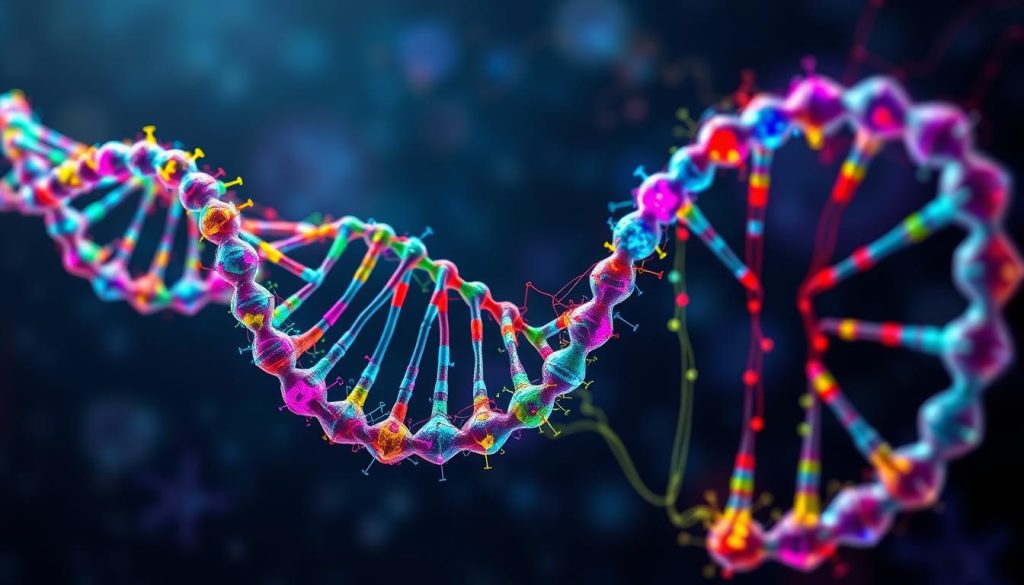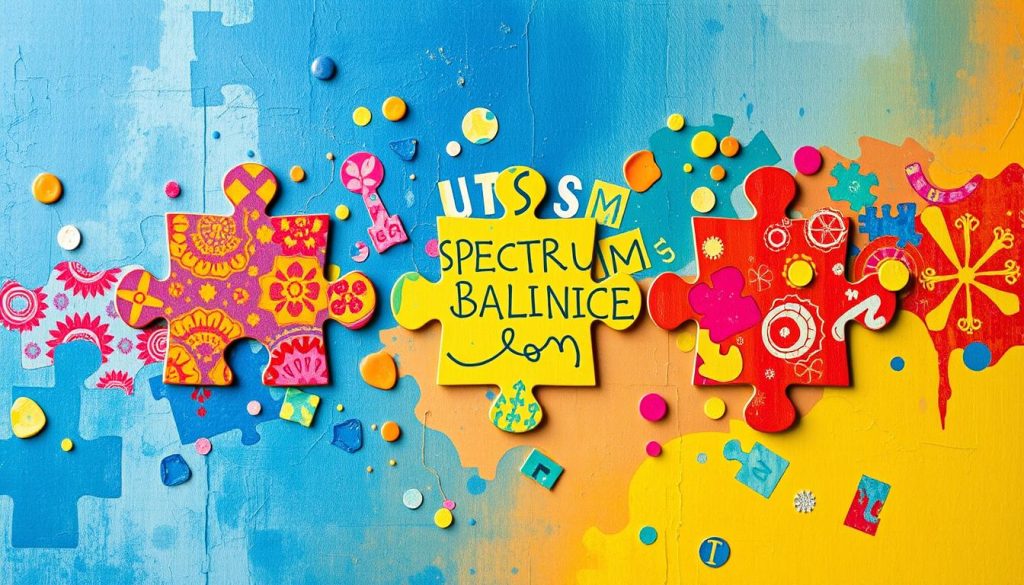Autism spectrum disorder (ASD) is a complex condition that affects how people interact and communicate. It also impacts their behavior. Understanding ASD can be tough because it varies a lot from person to person.
This guide explores what autism spectrum disorder is. We’ll look at its characteristics and how it affects individuals and families. We’ll cover signs, diagnosis, and support strategies to give you a clear picture of ASD.
By the end of this guide, you’ll know more about autism spectrum disorder. You’ll understand how it affects those who have it. Let’s start our journey to learn more about ASD.
Understanding What is Autism Spectrum Disorder
Autism spectrum disorder (ASD) is a complex condition that affects how people interact, communicate, and behave. Over time, our understanding of ASD has grown. This has led to a clearer definition of the condition.
Defining ASD in Modern Medicine
In today’s medicine, ASD includes a range of neurodevelopmental conditions. It involves challenges in social skills, repetitive behaviors, and communication. The severity and mix of symptoms differ greatly among individuals.
| Core Features of ASD | Description |
|---|---|
| Social Communication | Difficulty in social interactions and understanding social cues |
| Repetitive Behaviors | Engaging in repetitive actions or having intense interests in specific topics |
| Sensory Sensitivities | Heightened or reduced sensitivity to sensory stimuli |
The Spectrum Concept Explained
The term “spectrum” in autism spectrum disorder shows the wide range of symptoms and abilities. Some people with ASD need a lot of support, while others can live independently and excel in certain areas.
Historical Evolution of ASD Understanding
Our view of autism has changed a lot from its first description in the 1940s. What was once seen as rare is now known as a common neurodevelopmental disorder. This change has led to better diagnosis and support for those with ASD.
Early Signs and Symptoms of ASD
Spotting autism spectrum disorder symptoms early is key to better outcomes. Parents and caregivers should keep an eye out for important signs in their child’s growth. These signs often show up before age three and can differ a lot from one person to another.

Children with ASD often face social communication challenges. They might not make eye contact, struggle to get what facial expressions mean, or find it hard to join in conversations. Some kids might not answer when called by their name or show little interest in sharing experiences.
Repetitive behaviors and a strong focus on certain interests are also signs of ASD. Kids might do the same actions over and over, like hand-flapping or rocking. They could also become very interested in specific topics or objects and get upset if things change.
Sensory sensitivities are common in ASD too. Kids might be too sensitive to sounds, lights, or textures. Some might look for intense sensory experiences, while others try to avoid them.
High-functioning autism spectrum disorder has its own signs. These kids usually have average or above-average smarts but find social skills hard. They might be great at math or music but struggle with everyday tasks.
- Delayed language development
- Difficulty understanding social cues
- Unusual play patterns
- Intense focus on specific interests
- Sensory sensitivities
Remember, autism spectrum disorder symptoms can vary a lot. Early help can greatly improve a child’s development and life quality. If you see any worrying signs, talk to a healthcare expert for a proper check-up and advice.
The Different Types of Autism Spectrum Disorders
Autism spectrum disorder types vary widely, ranging from mild to severe. Understanding these differences helps in providing targeted support and interventions.
Classical Autism
Classical autism, often called Kanner’s autism, is the most recognized form. People with this type face challenges in social interaction, communication, and show repetitive behaviors. They may struggle with language development and have intense interests in specific topics.
Asperger’s Syndrome
Asperger’s syndrome is a high-functioning autism spectrum disorder. Individuals with Asperger’s typically have average or above-average intelligence and strong language skills. They may excel in areas like math or science but struggle with social cues and nonverbal communication.
PDD-NOS and Other Variants
Pervasive Developmental Disorder-Not Specified (PDD-NOS) is a term used when symptoms don’t fully match other types. It includes milder forms of autism that don’t fit strict diagnostic criteria. Other variants exist within the spectrum, each with unique characteristics.
| Type | Key Features | Common Challenges |
|---|---|---|
| Classical Autism | Significant language delays, social difficulties | Communication, social interaction |
| Asperger’s Syndrome | Normal language development, average/high IQ | Social skills, nonverbal cues |
| PDD-NOS | Mild symptoms, doesn’t fit other categories | Varies widely among individuals |
Causes and Risk Factors
Scientists are always studying what causes autism spectrum disorder. They think it’s a mix of genes and the environment. Knowing this helps find problems early and treat them.
Genetic Components
Genetics are a big part of autism. If one twin has it, the other might too. Some genes can make a person more likely to have autism. Over 100 genes have been found to be linked to it.

Environmental Factors
Things around us can also affect autism. These include:
- Advanced parental age
- Maternal infections during pregnancy
- Exposure to certain chemicals
- Complications during birth
Prenatal and Early Development Influences
The time before birth and early childhood are key for brain growth. Things that might affect autism risk include:
| Prenatal Factors | Early Childhood Factors |
|---|---|
| Maternal stress | Severe infections |
| Nutritional deficiencies | Immune system disorders |
| Exposure to toxins | Extreme prematurity |
Even though these things might raise the risk, they don’t mean someone will definitely get autism. The way genes and environment work together is different for everyone.
Diagnostic Process and Criteria
Getting a diagnosis for autism spectrum disorder is a detailed process. Doctors use different tools and criteria to check a person’s behavior, how they communicate, and their developmental history.
The journey to a diagnosis often begins with developmental screenings at regular check-ups. If there are concerns, a deeper evaluation is needed. This might include:
- Behavioral observations
- Cognitive assessments
- Language evaluations
- Medical tests
Doctors use the Diagnostic and Statistical Manual of Mental Disorders (DSM-5) criteria for diagnosing autism. These criteria look at two main areas:
| Area | Description |
|---|---|
| Social Communication | Difficulties in social interaction and communication |
| Restricted Interests | Repetitive behaviors or limited interests |
It’s important to identify autism early for timely help. Parents should seek professional help if they notice developmental delays. While online tests can offer initial insights, a formal diagnosis needs expert evaluation.
The diagnostic process can be tough because of the wide range of symptoms and their severity. It often involves a team of specialists. This team includes psychologists, speech therapists, and occupational therapists to ensure a complete assessment.
ASD in Children: Development and Challenges
Children with autism spectrum disorder face unique challenges. It’s important for parents, educators, and healthcare providers to understand these. This way, they can offer the right support.
Social Communication Issues
Kids with autism spectrum disorder often struggle with social interactions. They might avoid eye contact or have trouble understanding facial expressions. Starting conversations can also be hard for them.

Behavioral Patterns
Repetitive behaviors are common in autism spectrum disorder in children. This can include lining up toys or repeating words. Sticking to routines too tightly can also cause stress.
Educational Needs
Children with ASD often need special education plans. They might do well in some subjects but struggle in others. Tailored learning strategies help them reach their full ability.
| Area | Challenge | Support Strategy |
|---|---|---|
| Social Communication | Difficulty interpreting social cues | Social skills training |
| Behavior | Rigid routines and repetitive actions | Behavioral therapy |
| Education | Uneven skill development | Individualized education plans |
By focusing on these areas, we can help children with autism spectrum disorder. They can thrive in their daily lives and reach important milestones.
Adult Life with Autism Spectrum Disorder
Living with autism spectrum disorder in adults comes with its own set of challenges and opportunities. Many people with high-functioning autism lead happy and successful lives. They find success in different areas.
Work is a big focus for adults with ASD. They often do well in jobs that need attention to detail and logical thinking. Tech jobs are a good fit because they value these skills.
Building relationships and socializing can be tough. But, support groups help with social skills and making friends. Online communities offer a safe space for those who find it hard to meet people face-to-face.
Many adults with ASD can live independently. With the right support and planning, they can handle daily tasks and keep a home. Life skills training helps a lot in this area.
| Area of Life | Challenges | Strategies |
|---|---|---|
| Employment | Social expectations, sensory overload | Job coaching, accommodations |
| Relationships | Reading social cues, expressing emotions | Social skills training, therapy |
| Independent Living | Executive functioning, time management | Routines, assistive technology |
Getting ongoing support is key for adults with autism spectrum disorder. This might include therapy, vocational training, or life skills coaching. With the right help and understanding, adults with ASD can thrive and share their unique views with the world.
Treatment Options and Interventions
Autism spectrum disorder treatment includes many therapies. Each one is tailored to meet a person’s specific needs. Early intervention is very important for the best results. Let’s look at some common ways to help those with ASD.
Behavioral Therapies
Applied Behavior Analysis (ABA) is a common treatment for ASD. It aims to encourage good behaviors and reduce bad ones. ABA can enhance social skills, communication, and daily tasks.

Speech and Language Therapy
Many with ASD face challenges in communication. Speech therapy works to improve both verbal and nonverbal skills. It helps with speaking clearly, understanding social signals, and using language in various situations.
Occupational Therapy
Occupational therapy helps with everyday skills for those with ASD. It might involve learning to dress, eat, or write on your own. It also addresses sensory issues common in ASD.
| Therapy Type | Focus Areas | Potential Benefits |
|---|---|---|
| Behavioral Therapy | Social skills, behavior management | Improved interactions, reduced challenging behaviors |
| Speech Therapy | Communication, language skills | Better verbal expression, understanding social cues |
| Occupational Therapy | Daily living skills, sensory processing | Increased independence, improved sensory regulation |
It’s important to remember that treatment for autism spectrum disorder is not the same for everyone. A mix of therapies often works best. They are tailored to each person’s unique needs and strengths.
Supporting Families Affected by ASD
Families with autism spectrum disorder face big challenges. It’s important to understand what autism is and how it affects daily life. Let’s look at ways to support these families.
Creating a supportive home is key. Set clear routines and use visual schedules to make individuals with autism feel secure. Also, have quiet spaces for sensory breaks and encourage open communication.
Learning about autism is vital. Find reliable sources, attend workshops, and join support groups. This knowledge helps families advocate for their loved ones and make smart care decisions.
Family Support Resources
- Local ASD support groups
- Online forums for families
- Respite care services
- Family counseling
Don’t forget about self-care for caregivers. Make time for hobbies, keep social connections, and get professional help when needed. A strong support system is good for everyone in the family.
| Family Member | Support Strategies |
|---|---|
| Parents | Join support groups, attend therapy sessions, practice self-care |
| Siblings | Encourage open communication, arrange one-on-one time, involve in care routines |
| Extended Family | Educate about ASD, offer respite care, participate in family activities |
By working together and using available resources, families can build a supportive environment. This helps individuals with autism spectrum disorder grow and thrive.
Educational Approaches for ASD Students
Education is key for kids with autism spectrum disorder. Schools in the U.S. are working hard to help. They aim to make learning spaces where everyone feels included and supported.
Inclusive Education Strategies
Inclusive classrooms welcome kids with autism. Teachers use tools like visual aids and structured routines. They also make sure the space is friendly for all senses.
Peer mentoring programs help students connect and understand each other better.
Special Education Programs
Some schools have special programs for kids with autism. These programs offer:
- Small class sizes
- Staff trained in ASD support
- Sensory rooms for regulation
- Social skills groups
Individual Education Plans (IEPs)
IEPs are plans made just for each student with autism. They include:
- Academic accommodations
- Behavioral strategies
- Speech and occupational therapy
- Assistive technology

| Educational Approach | Benefits for ASD Students |
|---|---|
| Inclusive Education | Social interaction, peer learning |
| Special Education Programs | Targeted support, specialized resources |
| Individual Education Plans | Personalized goals, tailored interventions |
By using these methods together, schools can help ASD students a lot. They work on skills like reading, making friends, and growing independent.
Social Skills and Relationship Development
People with autism spectrum disorder often struggle with social interactions and forming relationships. This is true for both kids and adults, including those with high-functioning autism. Learning social skills is key to their happiness and well-being.
Social challenges in ASD can show up in many ways:
- Trouble understanding nonverbal cues
- Difficulty maintaining eye contact
- Challenges in initiating or sustaining conversations
- Struggles with empathy and perspective-taking
There are strategies to help improve social skills for those with autism:
- Social skills groups
- Role-playing exercises
- Video modeling
- Peer mentoring programs
These methods help people with ASD learn and practice social behaviors in a safe space. For those with high-functioning autism, learning about subtle social cues and complex situations is very helpful.
| Social Skill Area | Common Challenges | Helpful Strategies |
|---|---|---|
| Conversation | Turn-taking, topic maintenance | Structured conversation practice, visual cues |
| Nonverbal Communication | Reading facial expressions, body language | Video analysis, social stories |
| Friendship Building | Initiating interactions, shared interests | Interest-based social groups, peer buddies |
By working on these areas, people with autism can improve their social skills. They can then form deeper connections, making their social lives more fulfilling.
Managing Daily Life with ASD
Living with autism spectrum disorder (ASD) brings its own set of challenges. Creating a supportive environment is key to helping individuals with ASD thrive. Let’s look at ways to make daily life easier and more comfortable.
Creating Routines
Consistent routines are essential for those with ASD. They help reduce anxiety and give a sense of control. Using visual aids like calendars or picture schedules can help plan out the day.
This structure lets individuals with ASD move through their day with confidence.
Sensory Considerations
Many with ASD have sensory sensitivities. It’s important to tailor the environment to meet these needs. This might mean using noise-canceling headphones in loud places or wearing soft, comfortable clothes.
Understanding what triggers sensory overload is key. It helps in making a more comfortable living space for those with autism spectrum disorder.
Life Skills Development
Building independence is vital for individuals with ASD. Breaking down big tasks into smaller steps makes learning easier. Practicing everyday activities like cooking, cleaning, or personal hygiene boosts confidence and self-reliance.
With patience and support, people with autism spectrum disorder can learn essential life skills. This leads to greater autonomy.
FAQ
Q: What is autism spectrum disorder?
A: Autism spectrum disorder (ASD) is a complex condition. It affects how people interact, behave, and think. It’s called a spectrum because it impacts people differently.
Q: What are the main symptoms of autism spectrum disorder?
A: ASD symptoms include trouble with social interaction and communication. People with ASD might also have repetitive behaviors or interests. They might be very sensitive to certain sounds or sights.
Q: How is autism spectrum disorder diagnosed?
A: Doctors diagnose ASD through detailed evaluations. They look at behavior, developmental milestones, and talk to parents. A team of experts usually makes the diagnosis.
Q: What causes autism spectrum disorder?
A: The exact cause of ASD is not known. But research points to genetics and environment. Vaccines do not cause autism.
Q: Can autism spectrum disorder be cured?
A: There’s no cure for ASD. But early help and treatment can greatly improve life. Treatment aims to manage symptoms and help individuals reach their goals.
Q: What is high-functioning autism?
A: High-functioning autism is for those with average or above-average intelligence. They might face social challenges but can often live independently.
Q: How does autism spectrum disorder affect adults?
A: Adults with ASD may struggle in work, relationships, and daily life. But, with support, many lead fulfilling lives. Symptoms can change over time, but core traits often remain.
Q: What types of treatments are available for autism spectrum disorder?
A: Treatments for ASD include behavioral therapies and speech therapy. Occupational therapy and medications might also be used. Educational and social skills training are key parts of treatment.
Q: How can families support a child with autism spectrum disorder?
A: Families can help by learning about ASD and working with healthcare providers. Creating a supportive home and advocating for their child’s needs is important. Joining support groups can also be helpful.
Q: Can individuals with autism spectrum disorder live independently?
A: Many with ASD can live on their own, depending on their symptoms. Some need little help, while others require more support. Independence varies greatly among individuals.


















